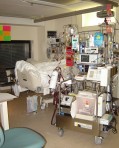Today, a kindergarten boy is undergoing surgery for a cancerous tumor found on his kidney. As he was not feeling well the other night, his parents took him to the emergency room, where after testing, they discovered a cancerous tumor. He was taken to Kaiser Hollywood Cancer Treatment and Surgery center where he is having one of his kidneys removed.
Over the past two years, my little friend Lauren has been battling brain cancer. She was diagnosed at age four and has been an inspiration, as she has bravely undergone intensive treatment. This week, she has taken a turn for the worst, and after a heroic battle, the doctors have determined that there is nothing left that they can do for her. Her parents have fought the fight alongside her and are now hoping to bring her home one last time.
 My nephew is a million dollar baby, as his entrance into the world required ECMO, Extracorporeal Life Support to survive and months in a NICU ward at Children’s Hospital. He is a miracle child because of the medical advances he was given.
My nephew is a million dollar baby, as his entrance into the world required ECMO, Extracorporeal Life Support to survive and months in a NICU ward at Children’s Hospital. He is a miracle child because of the medical advances he was given.
As I pray for Lauren and the little boy Matthew, I can’t help but wonder what the new health care regime will do to the advances in the medical miracles that these children will need to survive. I can’t help but wonder what rationing will occur and who gets to determine the worthiness of the recipient of treatment. The Reid bill depends on the recommendations of the U.S. Preventive Services Task Force according to Tom Coburn where he states, “The bill explicitly states, on page 17, that health insurance plans “shall provide coverage for” services approved by the task force. This chilling provision represents the government stepping between doctors and patients. When the government asserts the power to provide care, it also asserts the power to deny care.”
According to Cost of Kidney Cancer Report and the National Cancer Institute, there is a five-year rate of survival in the United States for kidney and brain cancer patients. Stephen Finan, a policy expert with the cancer society’s advocacy affiliate commenting on the healthcare loophole in the Senate bill said, “The primary purpose of insurance is to protect people against catastrophic loss,” Finan said. “If you put a limit on benefits, by definition it’s going to affect people who are dealing with catastrophic loss.” He also states that the cost of cancer treatment can exceed $100,000 a year (2010 The Associated Press, Tom Coburn).
Thus if life expectancy is short and cost is exorbitant, who will the government choose to cover as the “numbers of noninstitutionalized adults who have ever been diagnosed with cancer is 17.9 million”. This number does not include the statistics for childhood cancers, where according to The Cancer Cure Foundation “an estimated 9,100 new cases are expected to occur among children aged 0 -14, with 1,400 deaths. Cancer is the chief cause of death by disease in children between the ages of 1 and 14.”
 Dr. Coburn, a physician, is a Republican senator from Oklahoma, stated in an article in the Wall Street Journal,
Dr. Coburn, a physician, is a Republican senator from Oklahoma, stated in an article in the Wall Street Journal,
But the most fundamental flaw of the Reid bill is best captured by the story of one my patients I’ll call Sheila. When Sheila came to me at the age of 33 with a lump in her breast, traditional tests like a mammogram under the standard of care indicated she had a cyst and nothing more. Because I knew her medical history, I wasn’t convinced. I aspirated the cyst and discovered she had a highly malignant form of breast cancer. Sheila fought a heroic battle against breast cancer and enjoyed 12 good years with her family before succumbing to the disease.
If I had been practicing under the Reid bill, the government would have likely told me I couldn’t have done the test that discovered Sheila’s cancer because it wasn’t approved under CER. Under the Reid bill, Sheila may have lived another year instead of 12, and her daughters would have missed a decade with their mom.
The bottom line is that under the Reid bill the majority of America’s patients might be fine. But some will be like Sheila—patients whose lives hang in the balance and require the care of a doctor who understands the science and art of medicine, and can make decisions without government interference.
The American people are opposing this bill in greater numbers every day because the facts of the bill—not any tactic—are cause for serious concern.
These are legitimate concerns, not conspiracy theories running a muck. These are real people, who have benefited from the great medical innovations, that in part have come through the willingness to treat patients in spite of cost and projected length of mortality. What say you?

